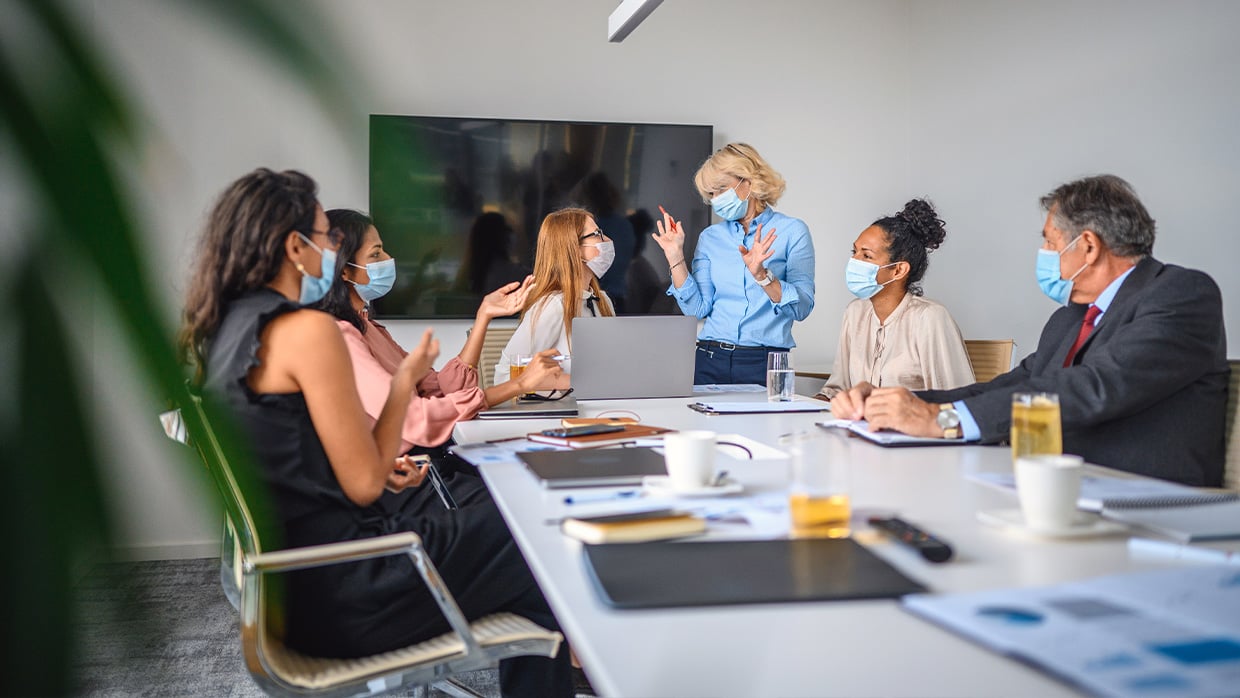Three ways partnering creates a better work experience

As employees return to their workplaces, they will notice things that didn’t catch their attention before the pandemic. How ventilated is the space? How often are surfaces disinfected? Is food prepared and packaged in the right way? Their expectations have changed.
“After the first lockdown, we went through a big exercise to adjust to how we disinfect, clean in this new reality,” says Philippe Casgrain, SVP Global FM and HSE at Sodexo. “We defined new standard operating procedures for airflow management, air conditioning, disinfection and more.”
They also have new expectations of corporate sustainability, the use of climate-friendly materials and food waste. “In one survey we conducted, 73% of organizations said sustainability has become more important to their employees since the onset of the pandemic,” says John Wright, Sodexo’s Senior Vice President Global Head of Food.
Employees will also want to use their workplaces differently, visiting for specific purposes and working in new ways. These expectations will place new demands on food and facilities managers and require much more than most organizations can deliver on their own. This is where partners come in. So how can they help to improve the workplace experience? And how might partnership models have to change to accommodate new workplace needs?
Partnering for flexibility and data

“When we asked people what they want when a widespread return to the office becomes possible, we thought they would say more virtual and flexible spaces,” says Casgrain. “And they did. But they also wanted more individual working spaces, which means more assigned seating and desks.”
The right partners could help employers navigate these changes and balance the dueling needs of their employees.
“Employees want much more personalization in terms of what they do, how they behave, what they consume – in everything”
“The enabler for that personalized experience is data analytics.”
And whereas pre-pandemic the number of people who would want to use a building each day was relatively predictable, post-pandemic working patterns are likely to be harder to predict and prepare for. Facilities managers might find that they need to solve challenges of staffing and supply by collecting data and insights from employees about when and where they intend to work each day.
“The workplace supply-demand equation used to be simple to solve but now it has become much more complex,” says Villar. “Demand has become much more individually-driven and hence “chaotic” whilst supply now mixes a large set of options,” he says. “You need to understand the demand, act on it and have a space-allocation tool that drives people to the right place, wherever the “place” is (office, home or a third space).”
Here partnerships can also help to manage an optimized workplace experience for all. For example, when professional services firm Grant Thornton needed tools to quickly and safely reopen its offices following the Covid-19 lockdown, it was able to draw on an existing partner solution from Wx* solutions. The space management solution, which had been installed in 2017 to optimize real estate costs, allowed Grant Thornton’s Paris office to adapt at speed by configuring its Wx* solutions mobile app to display its new workplace layout and availability of workstations and meeting rooms.
“Our building being already equipped with Wx*’s solution, we were able to implement our social distancing rules and sanatory capacities and supervise them in real-time immediately,” says Muriel Schneider, Secrétaire Général, Grant Thornton. As a result, Grant Thornton was able to reopen its offices in early May 2021 and to share real-time workplace availability with its employees.
Partnering on the social mission
Partners can help companies with their social mission too – from deliberately offering opportunities to companies with diverse owners or leaders, to teaming up to support local community initiatives. For example, during the early onset of the pandemic, Sodexo employees based in Connecticut were redeployed to work alongside staff from their partners at Food Rescue US and Boehringer Ingelheim Pharmaceuticals to prepare 250 daily meals for food-insecure individuals and families.
In addition to combatting food insecurity, the partnership benefitted food service employees who had been adversely impacted because of the shift to remote working. “We wanted to help with employment continuity during this troubling time,” said Dr. Wolfgang Baiker, U.S. Country Managing Director and President and CEO, Boehringer Ingelheim USA. Carol Shattuck, CEO of Food Rescue US, agreed: “Now more than ever, these partnerships are critical”.
In many cases, an organization’s social mission – whether that relates to sustainability, climate or other purpose – requires facilities managers to challenge assumptions and explore new approaches.
Wright explains how Sodexo has partnered with its vendor partners and external NGOs to establish a new group that will offer clients access to research insights and expertise. “We've created a group we call the Future Food Collective,” he says. “This is a group of individuals who we bring to the table to challenge us on some of the decisions we're taking.” The collective aims to work to deliver relevant food solutions by working with chefs on topics such as health and wellness, plant-based innovation and new cooking methods.
Partnering to increase corporate sustainability

Greenhouse gas emissions from supply chains are on average 5.5 times as high as corporations’ direct emissions. So, procurement really does matter. What does this mean for food and facilities managers?
According to Wright, partnerships can contribute to a more sustainable workplace in three core ways:
- Creating a market for a new product that is more sustainable than what has previously been in place, usually promoting new businesses and startups in the process.
- Introducing employees to these products so that, if they like them, they will want to purchase them again for their own home use.
- Educating consumers, customers and clients on carbon and sustainability to ensure they are making informed decisions both at work and at home.
Sodexo, for instance, has launched a partnership with UK-based non-profit Veganuary to encourage employees to eat plant-based meals at the schools, government offices, hospitals and company offices where it is responsible for catering. The partnership has introduced millions to vegan options such as ‘tofish and chips’ and ‘fake and ale pie’.
“Most people want to eat more plant-based foods to help reduce their environmental impact,” says Toni Vernelli, Head of Communications at Veganuary. “But often they do not know what is available or are hesitant about trying unfamiliar foods.” Work, then, could become the place where for the first time you try a meatless burger or a dairy-free milk alternative.
Wright expects changing consumer expectations to shape the demand for food. These expectations might require organizations to partner with local restaurants to offer delivery or services onsite. Wright expects them to move toward inviting brands into the workplace: “We’ve got a pilot at the moment where some of the options offered in the convenience area at our client sites is from Marks and Spencer’s to-go range,” he says.
A final thought
There is no doubt about it: employees now have more stringent workplace expectations. By exploiting the right partnerships food and facilities managers can ensure they are able to meet – and exceed – the demands of this new workplace experience. The only question now is: What partners do you need?
This article is part of Sodexo’s ‘Experience Next’ thought leadership series on the work-life transformation.
Does your workplace experience measure up? Explore the rest of the series
*Transferred to Jooxter (May 2023). A commercial partnership between the 2 entities will enable Sodexo's clients to benefit from the services and innovations.
